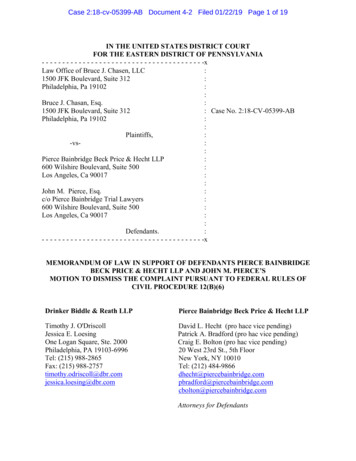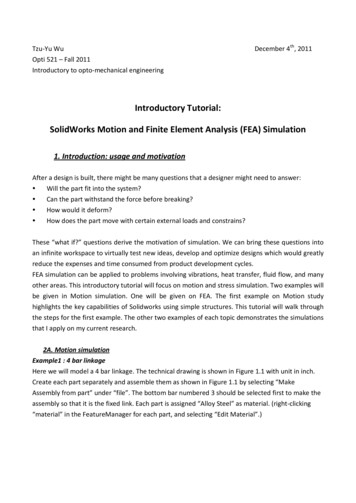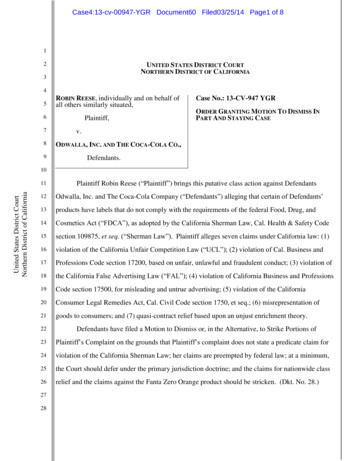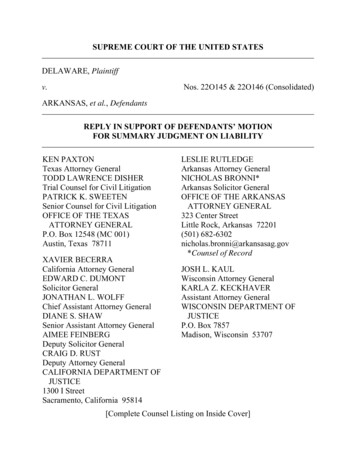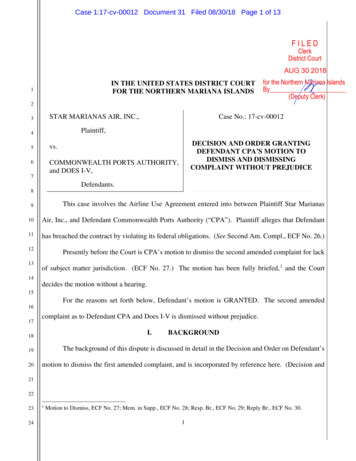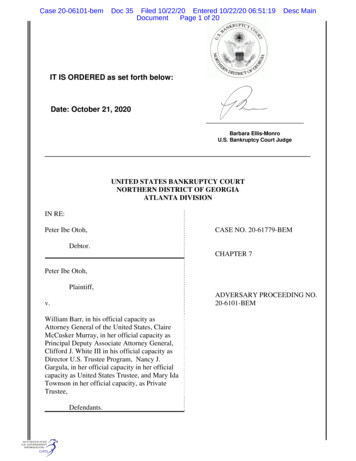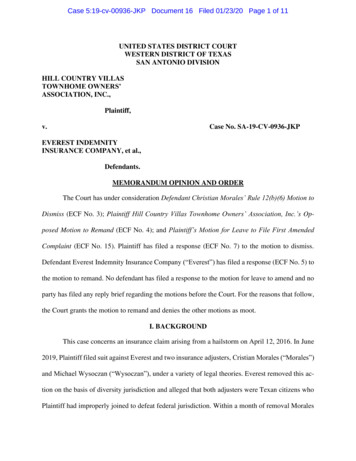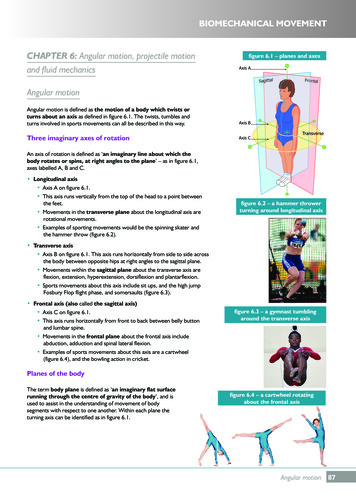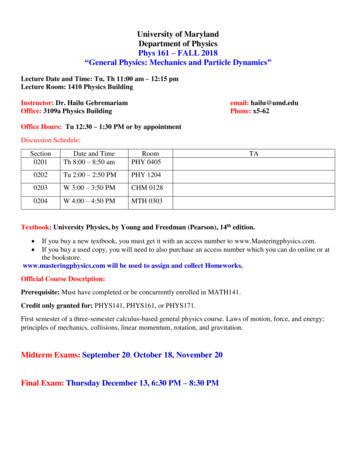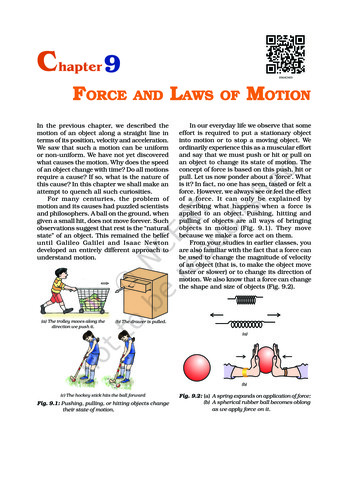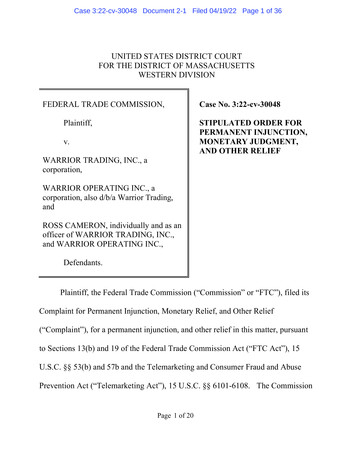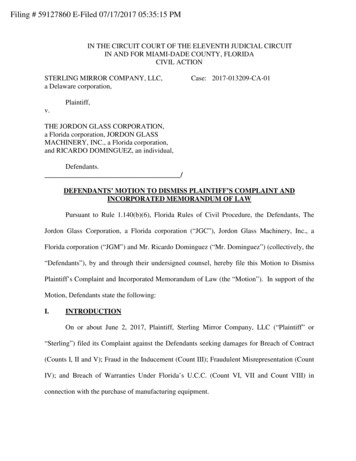
Transcription
Filing # 59127860 E-Filed 07/17/2017 05:35:15 PMIN THE CIRCUIT COURT OF THE ELEVENTH JUDICIAL CIRCUITIN AND FOR MIAMI-DADE COUNTY, FLORIDACIVIL ACTIONSTERLING MIRROR COMPANY, LLC,a Delaware corporation,Case: 2017-013209-CA-01Plaintiff,v.THE JORDON GLASS CORPORATION,a Florida corporation, JORDON GLASSMACHINERY, INC., a Florida corporation,and RICARDO DOMINGUEZ, an individual,Defendants./DEFENDANTS’ MOTION TO DISMISS PLAINTIFF’S COMPLAINT ANDINCORPORATED MEMORANDUM OF LAWPursuant to Rule 1.140(b)(6), Florida Rules of Civil Procedure, the Defendants, TheJordon Glass Corporation, a Florida corporation (“JGC”), Jordon Glass Machinery, Inc., aFlorida corporation (“JGM”) and Mr. Ricardo Dominguez (“Mr. Dominguez”) (collectively, the“Defendants”), by and through their undersigned counsel, hereby file this Motion to DismissPlaintiff’s Complaint and Incorporated Memorandum of Law (the “Motion”). In support of theMotion, Defendants state the following:I.INTRODUCTIONOn or about June 2, 2017, Plaintiff, Sterling Mirror Company, LLC (“Plaintiff” or“Sterling”) filed its Complaint against the Defendants seeking damages for Breach of Contract(Counts I, II and V); Fraud in the Inducement (Count III); Fraudulent Misrepresentation (CountIV); and Breach of Warranties Under Florida’s U.C.C. (Count VI, VII and Count VIII) inconnection with the purchase of manufacturing equipment.
Case: 2017-013209-CA-01This case concerns commercial manufacturing equipment. Plaintiff is not a consumer, itwas buying industrial equipment. Plaintiff decided to get into tempered glass manufacturing forthe first time in its 40 year history. Plaintiff did this not just to supply its own needs, butapparently to sell to others because it is seeking lost profits with regard to such sales. Asalleged, Plaintiff wrestled with the decision for years before taking the plunge. It is also clearfrom the complaint that Plaintiff was ill equipped for installation, lacking even proper electricalsupply. What followed was a classic case of buyer’s remorse. Plaintiff refused to make thefinal payments. Plaintiff now complains about a host of alleged problems that range from theimaginary to the absurd. Plaintiff complains that the manufacturer on the contract was differentthan the one that manufactured the first machine it ever saw years prior. Plaintiff complainsthat the washer ought to have an internal heating unit, even though it did not purchase a washerwith an internal heater. Plaintiff complains about alleged “defects” that would have beenobvious at delivery, such as the size and color of the industrial equipment, yet it accepteddelivery. Finally Plaintiff complains about phantom scratches on glass that it claims render themachine non-functional, yet it never rejected the machine and still complains that, because it didnot make final payment, it was not given the codes to run the machine. To avoid the damagesdisclaimers, Plaintiff adds two grab bag fraud counts alleging the host of allegedmisrepresentations set forth above that have nothing to do with the alleged harm: unsalable,scratched glass.The Complaint ignores the contract, alleges oral statements disclaimed in writing, andignores limitations on damages. Either the machines work or they don’t. If they don’t, JordonGlass has a duty to repair. But under no circumstances can Plaintiff keep the machines, not payfor them, and collect millions in damages.2
Case: 2017-013209-CA-01II.THE CONTRACTUAL RELATIONSHIP BETWEEN PLAINTIFF AND JGMA.The Furnace Contract.1.The Plaintiff alleges that a contractual agreement exists between the Plaintiff andJGM with respect to the purchase of a furnace. As reflected in Exhibit A, the contract was forthe sale and purchase of a furnace manufactured by Gangxing (the “Furnace Contract”). SeeComplaint at ¶ 18, and Ex. A at pgs. 2, 4 and 11. Neither JGC nor Mr. Dominguez were partiesto the Furnace Contract.2.Notably, under the Furnace Contract, the only guarantee made by the JGM as tothe quality of the tempered glass to be produced by the furnace was that it would meet the ANSIZ97.1 standard. See Complaint, Ex. A at pg. 5. Contrary to the allegations in the Complaint,the Furnace Contract is devoid of any term or condition that the tempered glass would bescratch-free.3.The terms and conditions of the Furnace Contract clearly and unambiguousprovide for the following warranties and limitation of warranties and liabilities:4.Warranties/limitation of liabilities. Seller’s warranties and limitationof liabilities with regard to the Equipment are as follows, and are only effectiveupon full payment of the Purchase Price by Buyer:(a) Limited Material and Workmanship Warranty. Upon completion of theinstallation of the Equipment, Seller warrants only to the original Buyer thatEquipment will be free from defects in material and workmanship undernormal use for the use intended at the installation site. . . . Seller’sobligations under this limited material and workmanship warranty, andBuyer’s exclusive remedy, shall be limited solely to the repair, exchange orreplacement, at Seller’s election, of any material(s) or workmanship whichmay thus prove defective under normal use and service for the use intended,within one (1) year from the installation date, and which Seller’sexamination shall disclose to its satisfaction to be defective. If Buyer andSeller shall not agree as to whether the Equipment is defective and/or to whatextent the Equipment is defective, the parties shall mutually appoint, within3
Case: 2017-013209-CA-01ten (10) days after Buyer receives notice of Seller’s determination, anindependent third party to make this determination or determinations. Suchdetermination shall be made only with respect to whether or not theEquipment is defective. The cost of such determination shall be borneequally by Buyer and Seller. The determination of such independent partyshall be final and each party shall release the other party from any liability inconnection with such determination.(b) LIMITATION OF WARRANTIES AND LIABILITIES:(i) THE WARRANTIES STATED IN PARAGRAPH 4(A) AREEXPRESSLY IN LIEU OF ALL OTHER WARRANTIES,EXPRESSED OR IMPLIED, INCLUDING THE WARRANTIES OFMERCHANTABILITY AND FITNESS FOR A PARTICULARPURPOSE, AND ALL OTHER OBLIGATIONS OR LIABILITIES ONTHE SELLER’S PART.(ii) SELLER NEITHER ASSUMES NOR AUTHORIZES ANY OTHERPERSON TO ASSUME FOR IT ANY OTHER LIABILITIES INCONNECTION WITH THE SALE OF THE EQUIPMENT.(iii)THERE ARE NO WARRANTIES WHICH EXTEND BEYOND THETERMS OF PARAGRAPH 4(A) OF THIS AGREEMENT.(iv) [ . . . ](v) SELLER ASSUMES NO LIABILITY UNDER THIS WARRANTYFOR ANY TIME FOR WHICH THE EQUIPMENT IS NOT IN USE INTHE EVENT THAT ANY REPAIRS, REPLACEMENT OF PARTS,MAINTENANCE OR SUBSEQUENT REINSTALLATION AREREQUIRED. ADDITIONALLY, SELLER SHALL ASSUME NOLIABILITY UNDER THIS WARRANTY FOR INDIRECT ORCONSEQUENTIAL DAMAGES OR LOST PROFITS INCURRED BYBUYER.(vi) [ . . . ](vii) IT SHALL BE WITHIN THE SOLE DISCRETION OF SELLERWHETHER OR NOT SELLER’S TECHNICIAN SHALL BEREQUIRED TO ADDRESS ISSUES UNDER THIS WARRANTY.[ . . . ]Complaint, Ex. A. at pg. 16, ¶ 4 (emphasis in original).4.The Furnace Contract further provides that, “[i]f Buyer or Seller brings anyaction at law or equity . . . no cause of action by Buyer or Seller shall include a claim, nor mayrecovery be had against Buyer or Seller, for any punitive, incidental or consequential damages,including but not limited to, damages to property, for loss of use, loss of time, loss of profits orincome. Id. at pg. 18, ¶ 8(b).4
Case: 2017-013209-CA-015.Finally, the Furnace Contract includes an integration clause, which states: “ThisAgreement constitutes the complete and exclusive statement of the terms of the agreementbetween the parties pertaining to the sale of the Equipment, and supersedes all prior andcontemporaneous agreements and undertakings of the parties in connection with this sale.” Id.at pg. 18, ¶ 10(a).B.The Washer Contract.6.The Plaintiff further alleges that a contract exists between Plaintiff and JGM forthe purchase and sale of a horizontal washer manufactured by Ganxing Glass (the “WasherContract”). See Complaint at ¶ 29, and Ex. D. Neither JGC nor Mr. Dominguez were partiesto the Washer Contract.7.The Washer Contract also provides for a limited warranty, as follows: “Themachine(s) you have purchased is warranted for one-year by Jordon Glass against mechanicaland electrical defects . . .” Complaint, Ex. D at pg. 4, ¶ 1.8.Unlike the Furnace Contract, the Washer Contract does not contain anyrepresentations or warranties regarding the quality or performance of the machine under anystandard.9.Further, nowhere does the Washer Contract state the washer purchased wouldinclude a built-in heating component, a feature that Plaintiff repeatedly complains is lackingfrom the washer purchased. See generally, Complaint, Ex. D.III.PLAINTIFF’S FACTUAL ALLEGATIONS CONTRADICTED BY CONTRACTS10.The Plaintiff alleges that for forty years it has been in the business of selling andinstalling glass (including tempered glass) and mirrors. See Complaint at ¶ 8. For forty years,Plaintiff relied on third party companies to temper the glass. Id. at ¶ 9.5
Case: 2017-013209-CA-0111.Sometime in or around 2008, Plaintiff explored the idea of purchasing a furnaceto temper glass itself and discussed this idea with JGC, but in 2008, with the downturn in theeconomy, the idea was tabled until 2014. Id. at ¶¶ 10-12.12.In July 2014, JGC arranged for Plaintiff’s representative to visit one of JGC’scustomers in Florida to view a furnace sold by JGC so that Plaintiff could speak with thecustomer to gauge their level of satisfaction with the equipment. Id. at ¶ 13.13.Almost a year later, in May 2015, executed the Furnace Contract to purchase afurnace from JGM. Id. at ¶ 17. Despite the clear and unambiguous language of the contractdetailing the specifications of the furnace that Plaintiff contracted to purchase and that thecontract expressly stated that the furnace was manufactured by Gangxin, the Plaintiff allegesthat it anticipated it was purchasing the same furnace it had viewed almost a year earlier. Id. at¶¶ 13-18 and Ex. A. This alleged expectation is directly contradicted by the actual contract.Plaintiff further alleges that it had signed a previous contract for the purchase of a furnace, yetPlaintiff fails to attach this alleged contract to the Complaint and all of its claims in theComplaint are based on the purported “replacement contract” attached as Exhibit A to theComplaint.1 Id. at 17-18.14.The Plaintiff complains about a series of purported issues with the furnace andwasher it purchased, which issues do not constitute breaches of the contracts and wereforeseeable if Plaintiff had read the terms and conditions of the contracts at issue, including thespecifications of the manufacturing machines it contracted to purchase which were clearlystated in the contracts.1In fact, if Plaintiff had asserted claims based on the purportedly first contract for purchase of afurnace, the claims would be insufficient under Rule 1.130 for failure to attach the contract tothe complaint.6
Case: 2017-013209-CA-0115.For example, Plaintiff repeatedly complains in the Complaint that Mr.Dominguez failed to tell him on several occasions that the furnace Plaintiff had contracted topurchase was manufactured by Gangxin—a term that was clearly and unequivocally stated inthe contract. Compare Complaint at ¶¶ 20, 23 and 24 with Complaint, Ex. A (stating that thefurnace was manufactured by Gangxin).16.Similarly, the Plaintiff complains that the furnace contract states that JGM holdsthe patent to the furnace purchased by the Plaintiff. See Complaint at ¶ 35. However, contraryto the Plaintiff’s allegations, the contract actually states that the patent is pending. SeeComplaint, Ex. A at pg. 6.17.Plaintiff further complains that representatives from JGM were to handle theinstallation which was to take 3-4 weeks, but left after a few days and only technicians fromGangxin remained to finish the installation. See Complaint at ¶ 36. Again, the Plaintiff’sallegations contradict the written agreement as the contract states that that seller would coverthe cost of Jordon Machinery technicians “necessary” for the furnace installation and training,and does not guarantee that a JGM technician would be present during the entire installationprocess. See Complaint, Ex. A at pg. 10.18.Next, the Plaintiff complains that “the Furnace Contract also called for two airblowers to be provided, yet, JGM provided only one blower.” See Complaint at ¶ 42. Plaintifffails to recognize that pursuant to the Furnace Contract, the manufacturer “reserve[d] the rightto modify, enhance, substitute, change, delete, replace, and/or add components and/or otheritems related to the overall or specific design, assembly, operability, functionality, and featuresof the Tempering unit to achieve the specification requirements . . .” See Complaint, Ex. A atpg. 11. There is no allegation that the actual blower assembly is inadequate.7
Case: 2017-013209-CA-0119.With respect to the washer purchased, the Plaintiff complains that “the washerdoes not have a heating component which is an item that should be included for two reasons.”See Complaint at ¶ 55. Interestingly, the two reasons provided by the Plaintiff do not includethat it was a term of the contract. Instead, the Plaintiff alleges that the washer purchased shouldhave had a built-in heating component because it would make it a better washer. Id. While awasher with a built-in heating component may be a superior machine, it was not the machinethat Plaintiff contracted to purchase. See Complaint, Ex. D.20.The Plaintiff further complains that, despite the fact that it never made fullpayment on the furnace, JGM instructed Gangxin not to assist Sterling under the limitedwarranty. See Complaint at ¶ 61.However, this is a situation that was contemplated by theFurnace Contract and should have been expected by the Plaintiff. Specifically, the FurnaceContract specifically states that “warranty service does not initiate until the full outstandingbalance for the unit has been paid by the buyer.” See Complaint, Ex. A at pg. 13. Even takingthe Plaintiff’s allegations as true, Plaintiff agreed that it would not be entitled to service underthe contractual warranty until full payment for the furnace was completed.21.In short, the Plaintiff’s allegations contradict and ignore the contractualagreement negotiated between Plaintiff and JGM, and Plaintiff seeks damages for issues whichdo not constitute a breach of either the Furnace Contract or the Washer Contract.22.The Defendants seek dismissal of the Complaint because the Plaintiff’s claimsfail to state any claim under Florida law. Specifically, Plaintiff’s breach of contract claims(Counts I, II and V) fail to state a cause of action because Plaintiff does not allege the ultimatefacts to support the essential elements that a breach of a contractual term occurred or damageswere caused by a purported breach. Next, Plaintiff’s fraud claims (Counts III and IV) fail8
Case: 2017-013209-CA-01because they are barred by the merger doctrine and because the terms of the contracts at issuecontradict the purported misrepresentations there is no reasonable reliance as a matter of law.Finally, Plaintiff’s claims for breach of warranties under Florida’s U.C.C. based only on the saleof the washer fail because the only factual complaint alleged is that the washer bought anddelivered to the Plaintiff did not have a built-in heating component; however, the WasherContract does not provide for the sale and purchase of a washer with a built-in heatingcomponent.IV.MEMORANDUM OF LAW IN SUPPORT OF MOTION TO DISMISSA.Legal Standard Governing a Motion to Dismiss.When deciding on a motion to dismiss, the trial court is confined to the four corners ofthe complaint. Fla. R. Civ. P. 1.140(b)(6); Fresh Capital Fin. Servs., Inc. v. Bridgeport CapitalServs., Inc., 891 So. 2d 1142 (Fla. 4th DCA 2005). The facts alleged in Plaintiff’s Complaintmust be accepted as true, and all reasonable inferences must be drawn in favor of the pleader.See id. at 1445. The test for whether the pleader has stated a cause of action is whether thepleader could prove any set of facts that would support his or her claims. Wausau Ins. Co. v.Haynes, 683 So. 2d 1123 (Fla. 4th DCA 1996).Further, where the language of an exhibit to a pleading is inconsistent with the pleading,the language of the exhibit controls. Fladell v. Palm Beach County Canvassing Boar, 772 So.2d 1240, 1242 (Fla. 2000); Laganella v. Boca Grove Golf & Tennis Club, Inc., 690 So. 2d 705,706 (Fla. 4th DCA 1997); A.S.J. Drugs, Inc. v. Berkowitz, 459 So. 2d 348, 350 (Fla. 4th DCA1984); Franz Tractor Co. v. J.I. Case Co., 566 So. 2d 524, 526 (Fla. 2d DCA 1990); BlueSupply Corp. v. Novos Electro Mech., Inc., 990 So. 2d 1157, 1170 (Fla. 3d DCA 2008); HarryPepper & Assocs., Inc. v. Lasseter, 247 So. 2d 736, 736-37 (Fla. 3d DCA 1971).9
Case: 2017-013209-CA-01Moreover, pursuant to Rule 1.110(b)(2), Florida Rules of Civil Procedure, a pleadingmust contain, “a short plain statement of the ultimate facts showing that the pleader is entitledto relief.” (emphasis added). Pleadings must contain ultimate facts supporting each element ofthe cause of action—simple conclusions are insufficient. Clark v. Boeing Co., 395 So. 2d 1226,1229 (Fla. 3d DCA 1981). “Mere legal conclusions are fatally defective unless substantiated bysufficient allegations of ultimate fact; and every fact essential to the cause of action must beplead distinctly, definitely, and clearly.” Ocala Loan Co. v. Smith, 155 So. 2d 711, 716 (Fla. 1stDCA 1963) (emphasis added). Furthermore, Florida is a fact-pleading jurisdiction. See Cont’lBanking Co. v Vincent, 634 So. 2d 242 (Fla. 5th DCA 1994). (“Florida’s pleading rules forcescounsel to recognize the elements of their cause of action and determine whether they have orcan develop the facts necessary to support it, which avoids a great deal of wasted expense to thelitigants and unnecessary judicial effort.”). A party does not properly plead a cause of action byalleging conclusions of law that merely track the language of the statutes and lack factualallegations. See Ginsberg v. Lennar Florida Holdings, Inc., 645 So. 2d 490, 501 (Fla. 3d DCA1994).B.Plaintiff Fails To Attach The Signed Contract.The contract attached to the complaint is unsigned and is not the operative contract. Infact, Plaintiff’s contract is with JGC, not JGM. See Ex. A. Plaintiff was required to attach theoperative contract to the complaint. See Fla. R. Civ. P. 1.130. In lieu of dismissal, this Courtcan consider the contract attached hereto. Striton Properties, Inc. v. City of Jacksonville Beach,533 So. 2d 1174, 1179 (Fla. 1st DCA 1988)(court properly considered parties’ agreement on amotion to dismiss without going outside the pleadings, even though plaintiff failed to attach theagreement to the complaint).10
Case: 2017-013209-CA-01C.Plaintiff Fails to Meet a Condition Precedent.All counts of the Complaint related to the furnace are subject to dismissal because thePlaintiff failed to comply with a contractual condition precedent to bringing suit for an allegeddefective furnace. See Ballas v. Lake Weir Light & Water Co., 130 So. 421, 425 (Fla. 1930)(performance of conditions precedent must be alleged in action on contract or valid excuse fornonperformance stated); Hamilton v. Title Ins. Agency of Tampa, Inc., 338 So. 2d 569, 571 (Fla.2d DCA 1976) (performance of conditions precedent must be made to appear). The FurnaceContract provides, in relevant part:If Buyer and Seller shall not agree as to whether the Equipment is defectiveand/or to what extent the Equipment is defective, the parties shall mutuallyappoint, within ten (10) days after Buyer receives notice of Seller’sdetermination, an independent third party to make this determination ordeterminations. Such determination shall be made only with respect to whetheror not the Equipment is defective. The cost of such determination shall be borneequally by Buyer and Seller. The determination of such independent party shallbe final and each party shall release the other party from any liability inconnection with such determination.Complaint, Ex. A. at pg. 16, ¶ 4 (emphasis in original).The Plaintiff did not and cannot allege that it complied with the contractual conditionprecedent as an independent third party was never appointed to make the determinationscontemplated in the contractual agreement between the parties. Rather the plaintiff alleges thatthe furnace is defective and does not meet certain industry standards. These allegations areinconsistent with the condition. This should not be a disputed matter subject to litigation.Plaintiff alleges that “Sterling continued to test the furnace. . . . [and the pieces of glass] werewithout defect and they were not commercially acceptable.” Complaint at ¶ 66. The terms of11
Case: 2017-013209-CA-01the Furnace Contract preclude Sterling from making this determination and, instead, require anindependent third party to make such a determination before any party brings suit. 2Simply put, Plaintiff cannot bring suit on the basis that the furnace is defective until anindependent third party selected by the parties inspects the machine and makes a determinationas to whether the furnace is defective.Because the Plaintiff failed to comply with thiscontractually condition precedent, all claims related to the furnace (Counts I, III, IV and V)should be dismissed.D.Count I for Breach of the Furnace Contract Should be Dismissed for Failureto State a Cause of Action.Count I of Plaintiff’s Complaint purports to state a cause of action for Breach of theFurnace Contract. Under Florida law, in order to assert a breach of contract claim, a plaintiffmust allege the existence of a contract, a breach of the contract, and damages resulting from thebreach. Friedman v. New York Life Ins. Co., 985 So. 2d 56, 58 (Fla. 4th DCA 2008). Insupport of its breach of contract claim, the Plaintiff alleges that JGM breached the FurnaceContract because: (1) the glass produced by the furnace was not of “a good temperable quality”;(2) the glass produced by the furnace had visible scratches; (3) the furnace is defective in breachof paragraph 4 of the Terms and Conditions section of the Furnace Contract; (4) the glassproduced does not comply with the ANSI Z97.1 standard or the ASTM C 1048-12; (5) partssupplied by JGM were not UL compliant; and (6) two blowers were not provided to thePlaintiff. As discussed in more detail below, the Plaintiff cannot sustain a claim for breach ofthe Furnace Contract as alleged because either the Furnace Contract did not provide for the2While Plaintiff generally alleges that alleges that all conditions precedent have been metwaived or excused in paragraph 7, Rule 1.120 Florida Rules of Civil Procedure only allows oneto allege generally that the conditions have been met, not waived or excused. That has not beenpled. Moreover, the general allegation that the conditions have been met are overridden by themore specific allegations that Sterling tested the furnace and found it defective.12
Case: 2017-013209-CA-01terms and conditions upon which Plaintiff’s claim is based or the Plaintiff has failed to allegeultimate facts to sustain the essential element that damages were caused by the purportedbreach.1. There was No Contractual Duty to Provide Glass of a Good TemperableQuality.In support of Count I, Plaintiff alleges a breach of contract claim because JGM did notproduce glass that was of “a good temperable quality.” See Complaint at ¶¶ 72 and 73. TheFurnace Contract provides as follows:Glass Types to be Tempered:Common plate glass, pattern glass, sandblasted glass and opaque glass,concave-convex glass (concave-convex range 2mm), reflecting glassand temperable Low-E glassGlass Requirements:Glass must be of good temperable quality edged and/or seamed, washed,and dryComplaint, Ex. A at pg. 5.Pursuant to the Furnace Contract there was no contractual agreement that the temperedglass produced by the furnace would be of “good temperable quality.” Instead, there was arequirement that the input, the glass used to produce tempered glass, the output, would “be ofgood temperable quality.” Complaint, Ex. A at pg. 5. In other words, this requirement appliedto the glass that the Plaintiff would use to produce the tempered glass—not the final productproduced by the furnace. Moreover, there was no contractual agreement for JGM to provide theglass to be used to produce tempered glass. Therefore, allegations regarding deficiencies in theglass used cannot sustain a cause of action for breach of the Furnace Contract.13
Case: 2017-013209-CA-012. There was no Contractual Agreement that the Tempered GlassProduced by the Furnace Would be Free of es.Plaintiff also attempts to assert a cause of action for breach of the Furnace Contract onthe basis that the glass produced by the Furnace had visible scratches. However, the Plaintiff’sbreach of contract claim on this basis fails as a matter of law because the Furnace Contract iscompletely devoid of any term or condition that the glass to be produced by the furnace wouldbe scratch-free. Therefore, even if the Furnace produced glass with visible scratches this doesnot constitute a breach of the Furnace Contract, which dislcimed all other warranties other thanthose specifically described.3 Accordingly, Plaintiff cannot sustain its breach of contract claimon this basis.3. The Limited Warranty is Ineffective as a Result of the Plaintiff’s Failureto Pay in Full the Purchase Price of the Furnace.In further support of its claim for breach of the Furnace Contract, the Plaintiff allegesbreaches of the limited warranty contained in paragraph 4 of the Furnace Contract.SeeComplaint at ¶¶ 74-76. The limited warranty, however, is ineffective as a result of the Plaintiff’sfailure to pay the purchase price. With regard to the limited warranty, the Furnace Contractprovides, as follows: “Seller’s warranties and limitation of liabilities with regard to theEquipment are as follows, and are only effective upon full payment of the Purchase Price byBuyer . . .” Complaint, Ex. A. at pg. 16, ¶ 4 (emphasis added).In its Complaint, the Plaintiff alleges that it “had not yet made the final payment toJGM” of the furnace as of January 2017. See Complaint at ¶¶ 60 and 61. Moreover, thePlaintiff fails to allege in its Complaint that it has since paid the full purchase price in order to3As an aside, occasional scratches are part of the manufacturing process, and are addressed bybuffing.14
Case: 2017-013209-CA-01make the limited warranties in the Furnace Contract effective. As a result, Plaintiff’s breach ofcontract claim based on a purported breach of the Furnace Contract limited warranty fails as amatter of law as the limited warranty is ineffective. Accordingly, Plaintiff fails to state a causeof action for breach of contract based on a breach of the Furnace Contract limited warranty.4. Plaintiff Cannot Sustain a Breach of Furnace Contract Claim Based onAllegations that Glass Produced Did Not Meet Certain Standards.Next, the Plaintiff alleges that JGM breached the Furnace Contract because the glassproduced by the furnace does not comply with the ANSI Z97.1 safety standard or the ASTM C1048-12 standard for tempered glass.As an initial matter, the Furnace Contract does not make any guarantee or warranty thatthe glass produced will meet the ASTM C 1048-12 standard. In fact, there is no mention of theASTM C 1048-12 standard in the Furnace Contract. Accordingly, there can be no breach of theFurnace Contract based on failure to comply with the ASTM C 1048-12 standard as that wasnot a term or condition of the Furnace Contract. Further any warranties under Florida’s UCCwere expressly waived in the Furnace Contract. See Complaint, Ex. A at pg. 16, ¶ 4; see alsoFla. Stat. 672.316.With respect to the ANSI Z97.1, which is a safety standard (and, incidentally, doesallow for scratches on glass with certain restrictions), the Plaintiff fails to allege how the glassproduced by the furnace failed to comply with the ANSI Z97.1 standard and fails to allege anyrequirement under the ANSI Z97.1 standard that has not been met.4 Plaintiff’s allegation is aclassic legal conclusion falling short of the necessary pleading requirements because it fails tocite to the ANSI standard and how the glass produced by the furnace fails to meet said standard.4In fact, as Plaintiff knows, it did receive ANSI Z97.1 certification, a fact not denied in theComplaint.15
Case: 2017-013209-CA-01As a result, the Plaintiff claim for breach of contract under this factual basis is deficient andsubject to dismissal. Clark, 395 So. 2d at 1229.5. Providing UL Compliant Parts Was Not a Contractual Term and, Evenif it Was, Plaintiff Has Failed to Allege How the Parts Are PurportedlyNot UL Compliant.Plaintiff also alleges that JGM breached the Furnace Contract because some partssupplied were not UL compliant. See Complaint at ¶ 78. Yet, there is no contractual agreementthat UL compliant parts would be supplied.Rather, the Furnace Contract provides: Thecustomer is advised to determine if their local Authority Having Jurisdiction (AHJ) requiresspecial markings on the Tempering Furnace. Should the AHJ at the furnace-operating siterequire Underwriters Laboratory (UL) or similar third party certification markings, pleaseadvise Jordon Machinery prior to unit fabrication. The additional fee to meet special markingsrequirements, such as UL, is approximately 10-12% of the sale price.” Complaint, Ex. A at pg.12, Sec. H. The Furnace Contract further provides that: “The UL (Underwriters Laboratory)parts compliance option is presented if you plan (or are required) to have a UL site evaluationby your AHJ (Authority Having Jurisdiction) or if you
STERLING MIRROR COMPANY, LLC, Case: 2017-013209-CA-01 a Delaware corporation, Plaintiff, v. THE JORDON GLASS CORPORATION, a Florida corporation, JORDON GLASS MACHINERY, INC., a Florida corporation, and RICARDO DOMINGUEZ, an individual, Defendants. _/ DEFENDANTS' MOTION TO DISMISS PLAINTIFF'S COMPLAINT AND .
